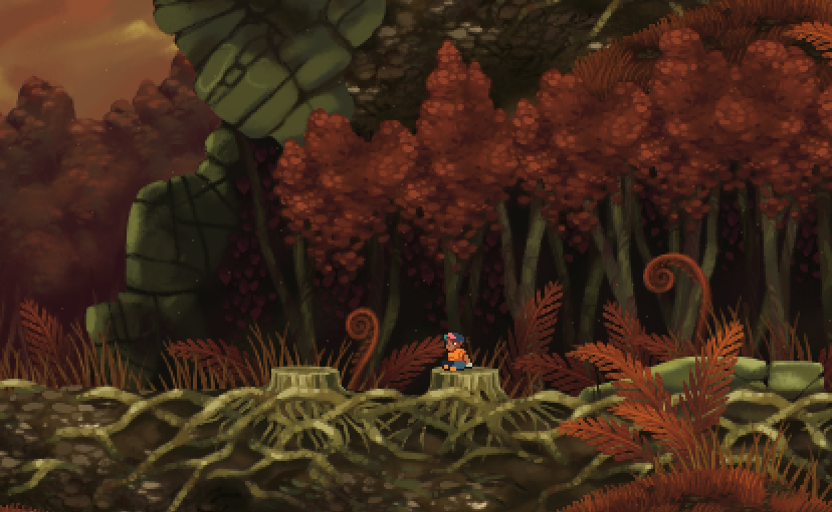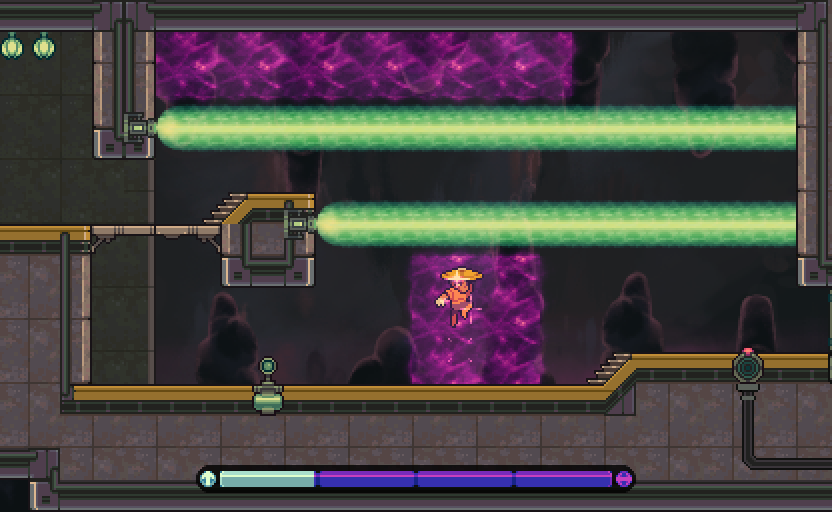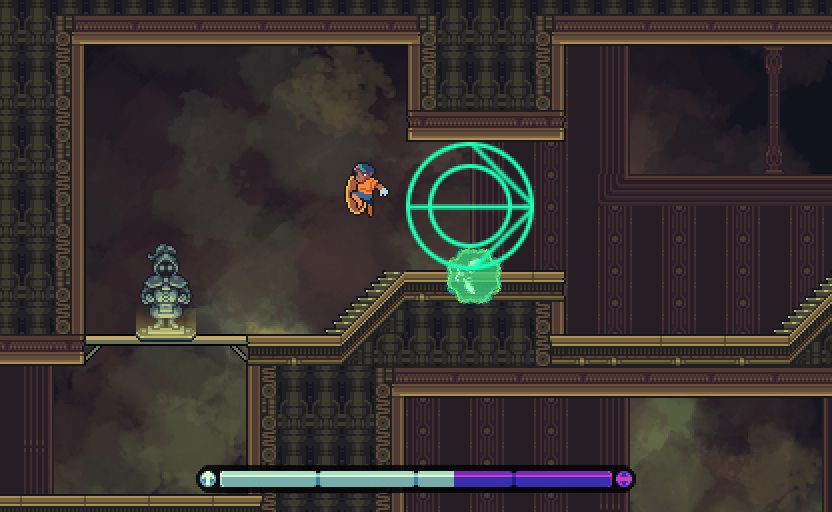Even The Ocean is the sort of game I’m pretty primed to like: It’s a well-designed, challenging 2D platformer with a unique energy-balancing mechanic. It features an inclusive, politically aware story, with narrative beats about community, identity and activism. It has pretty pixel art and moody music. And it was made by Analgesic studios, the two-person team behind one of my favorite titles of 2013, Anodyne, a beautiful, pointed take on 2D Zelda-style games.
That was always going to speak to me. But what I found in Even the Ocean surprised me even further: It’s not just a good game, but a milestone for a sensitive, thoughtful studio working in an uncertain and often downright scary world. It feels like a more mature work than Anodyne, which wore some of its messages (about violence, numbness, and getting lost in the unreality of games) on its sleeves.
Videos by VICE
Even the Ocean offers its ideas in a more subtle way, with a story that asks after the fundamental inequalities of our own culture. There are haves and have-nots in this world, but everything from the dialogue and characterizations to the world art suggests a deeper understanding of the way systems of oppression, power and inequality work on our own, far less pretty, planet.
Joni Kittaka and Sean Han-Tani-Chen-Hogan, the Analgesic team, have grown up making games: Anodyne started as a student project. Even the Ocean, appropriately, bears the marks of personal growth as well as professional expansion.
“I worked on Anodyne in a frenzy of pent-up longing, having been obsessed with making games for a long time but never really getting anywhere,” Kittaka told me via email. “And—although it feels naive to me now—at the time I got pretty excited by Indie Game: the Movie, and by hearing that people could do this for a living.
They found a better work-life balance that made the creation of Analgesic’s second game smoother. Along with that balance came an increasing activism and desire for change as a motivating factor for personal growth, and a need to make work that speaks to that awareness.
“It’s been a disheartening few years since we started,” said Kittaka. “The police brutality that Black Lives Matter has been responding to, Gamergate, this recent election, and just drastic inequality everywhere that poisons everything… I’ve certainly changed in response, I hope some of that change is growth.
“Like Sean, I hope to be a part of redistributing wealth and to reject the mentality of creating and valuing ever more expensive art. I like how Patreon allows for a step in those directions, but other structural change is needed. “

All Even the Ocean screens courtesy of Analgesic Games
While both noted that better work-life balance helped make Even The Ocean less harrowing to develop, the current glut of indie games on the market has made getting attention for their new project a challenge. What’s it like to be a small, sensitive team in this climate? Not especially easy.
“There’s a sense of being ignored,” Han-Tani-Chen-Hogan told me. “I think most small studios are feeling that. AAA companies/’AAA indies’ control the media and public’s attention, and there is no money for the media to take risks. Youtube and Twitch help, but feel like dice rolls and definitely cater to particular types of games.”
It’s not a problem unique to Analgesic, but Han-Tani-Chen-Hogan’s response showed a sensitivity to the wider world that I don’t always hear from game creators.
“What can we do? Well, I don’t know if the answer is necessarily within the games industry… AAA seems like a lost cause, and amongst the non-AAA community, there has generally been a sentiment of ‘Things Are Wrong,’ but in terms of action by people, things have felt conservative—both in games’ content, as well as consumers, creators and the media’s actions. Recent events seem like a wake-up call, so there is more hope there.
“I’m interested in small (both income and people-wise) studios not expanding accumulating absurdly disproportionate amounts of wealth dedicated to increasingly expensive projects—but trying to make enough to give back to devs doing worse financially.”
“That does create complicated power relationships, but seems necessary now, more than ever. “
The game shows a lot of that thoughtfulness and awareness about power and inequality. Aliph, the protagonist, is a young energy plant worker who finds herself in the middle of communities facing an energy crisis (which forms the basis for the energy-balancing platforming sections) and an awareness of their organizing power where higher-ups have been mistreating the populace (in the game’s in-depth story sections).

Even the Ocean
Underpinning this, Even The Ocean goes out of its way to be inclusive—in its text, with characters from all over the racial and gender and sexuality spectrums—and in its drive for accessibility. You can play just the story sections, if you aren’t up for the platforming, for example. And on the other end of the spectrum, it also offers a “gauntlet mode” and speedrunner-friendly options.
“The different segments of the game arose from wanting the game to incorporate reading-heavy and platforming-heavy sections—to show their interesting contrasts to players,” said Han-Tani-Chen-Hogan.
“We weren’t thinking of these features when we started, but as the years went on I became more and more aware of how many small and large barriers there can be to experiencing a video game,” added Kittaka.
“And as the story grew more and more developed, the more I thought it would be a bummer for someone to miss out just because they didn’t want to or weren’t able to do the platforming.”
“Personally,” they continued, “I’ve thought [about] so many times as I’ve gotten older, ‘I’d really love to play (or especially replay) ‘X’ if only I didn’t have to spend 30 hours.’ There’s really a range of reasons: making it more inclusive, more replayable, easier to critically analyze and discuss, etc. I’m really excited about these kinds of features and I hope they become more common!”
I’ve always been partial to media that works on multiple levels (ask me one day about 1997’s finest anti-war film that is also a really dumb action-war blockbuster, Starship Troopers), and it’s crucial to emphasize here that playing Even the Ocean doesn’t feel like a plodding or preachy civics lesson. It’s a fun, challenging game set in a bizarre, beautiful world: There are weird creatures and animated dreams and even a talking starfish to hang out with.
What it does so well is bring an intentionality to every element, in its tightly-designed gauntlets and thoughtfully drawn characters.
Every asset, from the retro world map to the tiny pixelated haircuts of various NPCs feels as if it was drawn to give life and character to the experience. Even protagonist Aliph’s tone towards her role in the world feels like a product of lived experience.
Sure enough, it actually is.
“She’s just out there trying to do her job and not to be a big mover and shaker,” said Kittaka. “But as she becomes central to the story of Whiteforge City, those qualities begin to have ripple effects, for better and for worse. There’s some exploration of the simultaneous complicity and otherness of being a ‘Model Minority’ that Sean and I have some experience with as East Asian Americans.”
I asked Kittaka and Han-Tani-Chen-Hogan what they really wanted players to get out of Even The Ocean. What messages and memories they want people to carry with them, long after they’re through with Aliph and Whiteforge City.

Even the Ocean
“For the youth who may not be interested or ready to ‘dig in’ to the themes and ideas motivating its creation,” Han-Tani-Chen-Hogan began, “We’d like to give an experience that leaves a strong impression, and perhaps a sense of ‘that was kind of different, but I’m not sure why’ that they may investigate in years to come.”
“For the older—to realize a change with our society requires an understanding of how power works and that we need a radical rethinking of the currents action in our world. Aliph’s job, how her job changes, what she actually does and what you as a player make her do, all seem important in that regard.”
Han-Tani-Chen-Hogan and Kittaka are clearly unafraid to push their ideas forward through their work, even in a space that feels fraught and financially uncertain. If anything, there’s a sense from the creators that they wish the political content of Even The Ocean was even sharper. That the game’s story was born of their ideas in 2014-2015, and here, in the terrifying waning days of 2016, it could read too broadly.
But there’s also a tone of hope.
“I’m hopeful that Even the Ocean might point some people in the direction of learning more about power structures and how they can distort our perceptions of balance,” offered Kittaka.
“If players can be a little transported, reflected, encouraged, or challenged, then they might be able to find more than I could personally tell them.”
More
From VICE
-

Screenshot: Sony Entertainment -

Screenshot: Ubisoft -

Screenshot: Studio Trigger -

Screenshot: Hopoo Games
